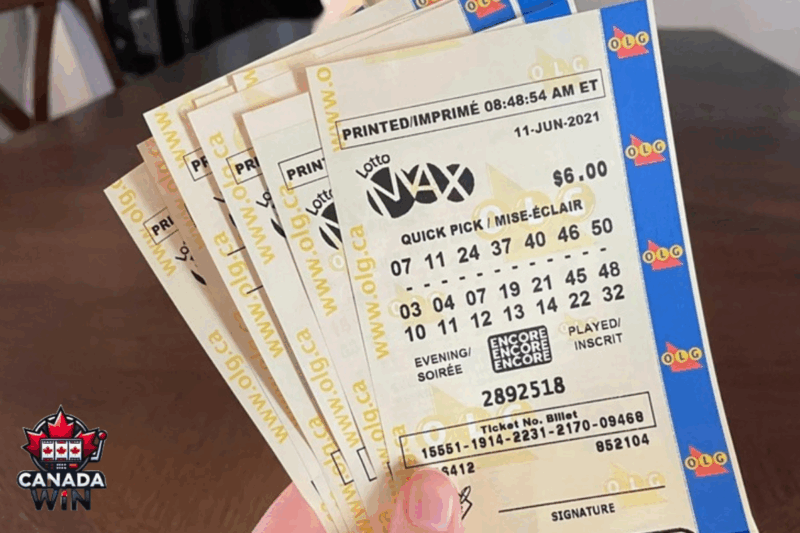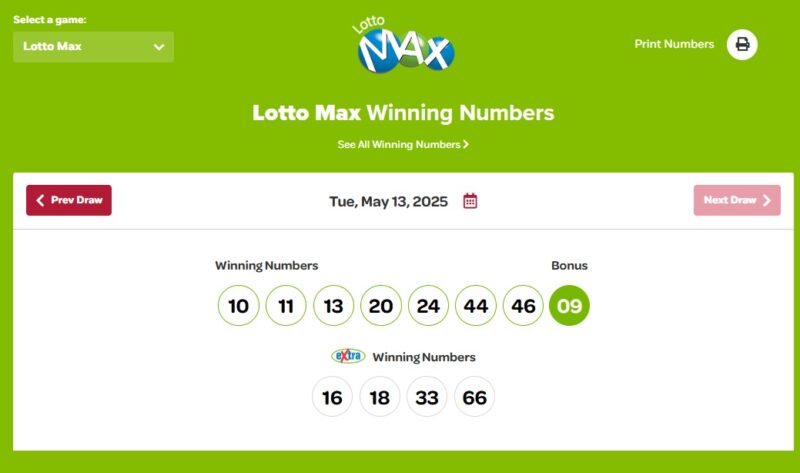Lotto Max Strategy: Does Number Frequency Matter?

Lotto Max Strategy to win the lottery depends on numbers you select and the way you choose.
Many lottery players pick the Lotto Max numbers using their lucky numbers like their birthday or anniversary number.
The fact is that using these numbers won’t improve your chances of winning.
Each number or combination of numbers has the same chance of winning.
As lotteries are games of chance you have no set skill or lotto max strategy to be a winner. What you need is a bit of your common sense and to know how the number frequency matter.
Lotto Max Strategy
Before using number frequency as a lotto max strategy understand that:
Lotto Max has two weekly draws on Tuesdays and Fridays.
The jackpots can grow up to $70 million and you have the options to play 7 out of 50 numbers. In addition to Maxmillion prizes, you will have more chances to win prizes with two new prize categories.
What is number frequency?

In Lotto Max, number frequency refers to how often each possible number (1 to 50) has been drawn over the history of the game.
What the players use as lotto max strategy is it’s a count of appearances for each number, typically tracked to identify “hot” (frequently drawn) and “cold” (rarely drawn) numbers.
Before you use the number frequency lotto max strategy, note the following:
- The Lotto Max lottery game uses numbers 1 to 50.
- Originally, the game used numbers 1 to 49, but this changed in May 2019 when number 50 was added, affecting the overall distribution.
- Each draw is random and independent, meaning past results don’t influence future outcomes. Each draw selects 7 balls from the pool without regard to past outcomes, so no number has an inherent advantage.
- Over many draws, each number should appear roughly the same number of times, reflecting the game’s fairness.
- Despite this, some players track number frequency, hoping that frequently drawn (“hot”) numbers or those that haven’t appeared recently (“cold”) might offer an advantage, though this approach lacks mathematical support.
In other words, occasional short-term “hot streaks” (a number appearing more often) are expected by chance and tend to regress to the mean over many draws.
A chi-squared test on the observed frequencies yields no significant deviation from a uniform distribution, indicating the variations seen are well within random fluctuation.
Mathematical Analysis

As mentioned above the number 50 was introduced in May 2019. Before that, Lotto Max draws used balls 1–49. This change means number 50 has far fewer total draws, but even with 50 included there is no pattern favoring any specific number.
Over 1,130 draws, the most- and least-drawn numbers differed by only a few dozen appearances (e.g. top ≈190 vs bottom ≈137 times). This spread (±20% around the mean) is consistent with random luck over hundreds of draws, not a bias in the machine.
Formal testing (e.g. chi-square) confirms that any differences are not statistically significant – the chance of observing this variation if all numbers were equally likely is high (p≈0.6), reinforcing that the draw is fair.
What does the lottery experts say?
Experts in probability emphasize that all combinations are equally likely and that past frequency has no predictive power . As one analysis notes, “every number combination has an equal chance of being drawn. Just because a number appeared more frequently in the past doesn’t mean it’s ‘due’ to appear again”.
This is a classic gambler’s fallacy: believing “hot” numbers will continue or that “cold” numbers are due. In fact, longer-term studies show that any apparent patterns in lottery numbers fade as more draws are added.
The World Lotteries Association similarly points out that any sequence of numbers (even “1,2,3,4,5,6”) is just as likely as any other underscoring that perceived streaks are illusory.
Michael Wallace, associate professor in the department of statistics and natural science at the University of Waterloo, said in a recent video interview with CTVNews.ca.
“When it comes to these lotteries, your chances of winning those really big prizes are so small that it’s probably not really going to make much of a difference in terms of your decision making,” Wallace said. “I would always say, if you’re going to play a lottery like this, play it for fun. Don’t play it expecting to win one of those really big prizes. You might, but it’s very, very unlikely.”
Does Number Frequency Matter?
The answer to the question about does number frequency matter in Lotto Max strategy it is believed that every Lotto Max draw is a fresh random event; the history of past draws does not change the odds for any given number.
The the observed frequency differences (some numbers appearing more often in the data) lie within expected random variation.
So be clear that Lottery mathematicians and analysts warn that picking “hot” numbers is not a winning strategy – it’s simply gambling on chance, not exploiting any underlying pattern.
Thus using number frequency on Lotto Max strategy to choose Lotto Max numbers does not improve one’s odds; each number is equally likely, and any short-term anomalies are due to randomness.
Takeaways
It has been seen that Lotto Max previous number frequency show no consistent bias toward particular numbers – the game behaves as a fair random draw. Both the data and experts agree: choosing frequently drawn (“hot”) numbers does not increase your chances of winning.
All combinations have equal probability, so playing should be done for fun rather than relying on any frequency-based Lotto Max Strategy.
FAQs
What is number frequency in Lotto Max?
Number frequency refers to how often each number (1 to 50) has been drawn in Lotto Max over its history. It tracks which numbers have been drawn more or less frequently, often used by players to identify “hot” and “cold” numbers.
Do frequent numbers have better odds of being drawn in Lotto Max?
No, each number in Lotto Max has an equal chance of being drawn in every game, regardless of past frequency. The draws are random and independent, meaning past results do not influence future outcomes.
Why do some players focus on number frequency?
Many players believe that frequently drawn numbers (hot numbers) are more likely to appear again or that rarely drawn numbers (cold numbers) are “due” for a win. This is a common misconception and part of the “gambler’s fallacy.”
Has any research proven that number frequency is a winning strategy?
No credible research has proven that tracking number frequency improves your odds in Lotto Max. Studies consistently show that any patterns in number appearances are random and not predictive.
Will I win Lotto Max if I use number frequency Lotto Max strategy?
While it might be fun to use frequency data as a part of your strategy, it offers no real advantage. Every combination of numbers is equally likely to be drawn, making frequency-based strategies no more effective than picking numbers at random.
